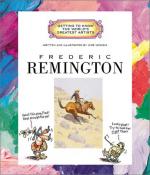|
This section contains 4,710 words (approx. 16 pages at 300 words per page) |

|
SOURCE: "When West Was Wister," in The New Republic, Vol. 167, No. 8, September 2, 1972, pp. 28-33.
In the following review of My Dear Wister: The Frederic Remington-Owen Wister Letters, Seelye examines the relationship between these two artists and illuminates their views of the American West.
When Huck Finn declared that he was going to light out for the Territory, he was speaking of the area beyond Arkansas and Missouri, the present states of Oklahoma and Kansas, as it existed in the 1840s. He was expressing the wanderlust of all Americans, for whom the westering urge had held, like the trade winds, for more than two centuries, but he was expressing in particular Mark Twain's own discontent with "civilization," the strictures and structure of the eastern establishment as opposed to the open, untrammeled spaces and freedom of the western territories. The Adventures of Huckleberry Finn is set in the 1840s, but...
|
This section contains 4,710 words (approx. 16 pages at 300 words per page) |

|


